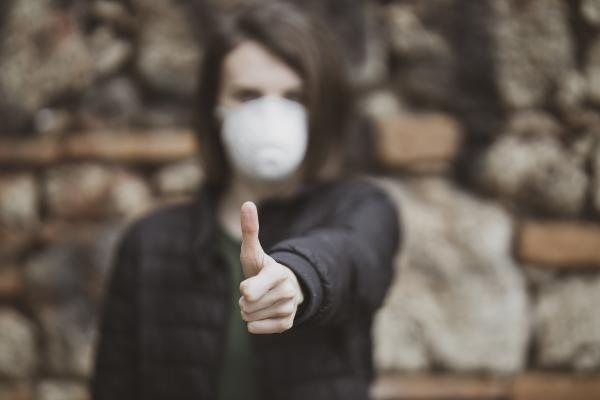When we are infected with COVID-19 or if you are one of the fortunate few to have been vaccinated, our immune system kicks in. Based upon COVID's typical clinical course and ability to shed or transmit virus, it takes 10-14 days for your immune system to make you resistant. Simultaneously, you also become far less likely to transmit the disease to others, that trajectory being shorter and earlier. Even with a cessation of viral shedding and recovery from your symptoms, your immune system continues to ramp up a response for several more weeks.
Vaccination follows a similar pattern; current guidance is that you are considered "immune" one to two weeks after your second injection – four to six weeks after your first. That is why you have seen reports of vaccinated individuals coming down with COVID-19. More importantly, you continue to be able to transmit the virus to others immediately after vaccination and for an unclear time afterward. That is why even though vaccinated, to protect others, you need to continue to wear a mask and social distance. Being vaccinated is not the "get out of jail" card you might have imagined in terms of your behavior.
In the classic epidemiologic SIR model [1], the Recovered are a monolithic group, all are immune, and no one continues to harbor or transfer the virus to others. That is not the real-world case, as a recent article in Science points out.
The researchers made use of the information we already have on the six coronaviruses widely circulating before COVID-19. Four are causes of forms of "the common cold." They are termed endemic; we can think of them as domesticated, a virus we can and do live with. The other two are the family's bad actors, MERS and SARS CoV-1, both exceptionally infectious and deadly, and blessedly, locally contained.
They divided that monolithic recovered group into three sub-groups, characterizing by our immune response over time. The first is "fully" immune, strongly resisting becoming infected and not acting as a carrier. The second can become reinfected; their immunity results in mild symptoms, but they retain an ability to share their virus with others. The third group is a variation on the second, reinfected but asymptomatic and still able, now more secretly, to share the viral wealth. Their categorization is based upon a small study of reinfection involving one of those nicer endemic coronaviruses.
- Since the coronavirus being tested was endemic, all 15 subjects had antibody evidence of prior infection. All were then exposed to a new dose of the virus.
- Five did not become reinfected; they had remained "fully" immune
- Ten experienced "viral replication," they were reinfected.
- All of the ten had lower immunoglobulin levels before that new exposure, and all experienced a boost in their immunologic response with re-exposure. Coronavirus elicits immunologic memory.
- All shed virus for about six days – they remained transmitters. Eight had symptoms of a cold – that milder symptomatic response. Two were asymptomatic.
One year later, they were again exposed to the virus
- All five of the previously "fully" immune now became infected, shedding virus for about two days; only one was symptomatic - milder disease and a shorter period of transmission.
- Of the previously infected ten, three were now "fully" immune and did not become reinfected, and only one of the remaining seven was symptomatic.
As the data suggest, your immunity and ability to further transmit these domesticated coronaviruses waxes and wanes over time – if we are lucky, that is how COVID-19's herd immunity will look.
The researchers also used data, from China, on the presence of antibodies to these domesticated viruses by age. They found antibodies in children, with no evidence of their presence past the age of 15. With reflection, this should not be surprising. Remember, these viruses have been around for some time, so adults have either succumb or recovered. Adults have retained an immunologic memory – and for those who become reinfected, they mount a response, suffer a runny nose, and may or may not be able to pass it along to their friends. The only people "naïve" to the virus, their immunologic system finding it "novel," are newborns and children, who become the primary transmitters.
Why should we believe this will be the outcome?
What if COVID-19 acts more like MERS or SARS? The short answer is that these viruses are more infectious and virulent – there is precious little time to treat you or transmit the virus onward once you become ill. COVID-19 begins to shed stealthily, long before you are symptomatic enough to declare yourself ill – it gets around. COVID-19's victims are a significant part of our population but nowhere near as large as the "victim pool" of MERS or SARS. COVID-19's pattern of spread and virulence appears more like its domesticated cousins.
COVID-19 infection confers immunity upon the survivors. It is unclear how long that immunity lasts, but recent studiesfrom the UK on healthcare workers suggest months. Only time will tell. Vaccination confers similar immunity without the downside of being gravely ill, let alone dying. It is unknown whether these targeted vaccines will be as effective as our immune response to infection, which targets more viral proteins – another uncertainty.
Masks and social distancing flatten the curve; they slow the virus's roll, not its final tally. Vaccination stops the pandemic, so it is crucial to get everyone, globally, vaccinated. If the researchers are correct, we will not require the vaccine forever; and COVID-19 will be in clinical reality, "just the flu." Children, "naïve" to the virus will have the most cases. To the degree that children infected with COVID-19 follow a benign course, vaccinated them may not be necessary.
[1] As a reminder, S represents the susceptible in the population, I, the infected, and R, the recovered.
Source: Immunological characteristics govern the transition of COVID-19 to endemicity Science DOI: 10.1126/science.abe6522




